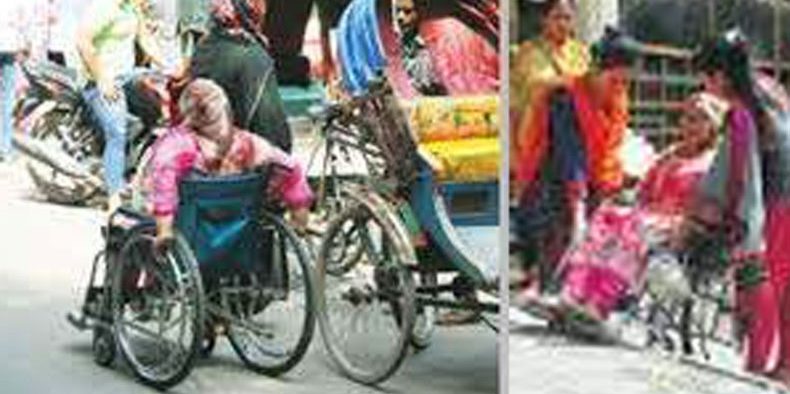Bangladesh roads, transports inaccessible to differently abled people

Int’l Day of Persons with Disabilities today
Bangladesh is set to observe International Day of Persons with Disabilities 2020 while the country is yet to provide the basic accessibility facilities in public transports, roads and footpaths for the differently abled people.
Tens of thousands of these people, due to lack of facilities to move and walk freely, are passing their days in agony as the promise of a normal life is yet to become a reality for them in Bangladesh.
From public transports, including buses, trains, launches across the country, to roads and footpaths in the capital are yet to become differently abled people friendly.
Lack of these facilities has not only put a strain on these people’s daily movement but also forced them to spend more money on transport when they step outside their homes.
Rights activists blamed the authorities for faulty planning and lack of proper education among people for the absence of basic facilities for these special need people.
State minister for the ministry of social welfare Md Ashraf Ali Khan Khasru told New Age on Tuesday that it would take time to change the scenario as facilities for people with disabilities were very limited at present.
According to the population census 2011, only 1.41 per cent of Bangladesh’s total population are differently abled.
The statistics from the Department of Social Services’ disability identification programme at present there are 21.43 lakh differently abled people with autism, down syndrome, visual, hearing and speech impairment and other kinds of physical and mental disabilities.
Against this backdrop, this year the day will be observed on December 3 with the theme ‘Building Back Better: Towards a Disability-inclusive, Accessible and Sustainable post-COVID-19 World’.
In the capital, the roads and most of the footpaths are not friendly for these special need people while they rely on others to use these infrastructures.
Under two city corporations of Dhaka, some of the footpaths were renovated to include yellow tiles having textured surface installed along the middle with a view to helping people with disabilities.
Even metal or concrete poles were put up at strategic areas along the side of the footpaths to obstruct and discourage motorcycle riders from moving onto the pavements.
The worst scenario involves the public transport facilities as no wheelchair users can get on buses in urban centres across the country though there are reserved seats for them in each bus.
Differently abled people are also seen struggling to get on trains and launches on their own. They are dependent on their companions who help them get into these transports.
‘There are no public transports, ranging from buses to trains or launches, for us in the country,’ said Access Bangladesh Foundation co-founder Mohua Paul, who is also a wheelchair user.
There are no facilities to get on or off buses and bus doors were too small to allow wheelchairs inside while transport workers and passengers often do not want to take disabled people on buses, she said.
In most cases, footpaths in the capital do not have any slope to get down as metal bars were erected at the end of all footpaths to obstruct motorcycles from running on pavements, Mohua pointed out.
All this also stopped disabled people from using these infrastructures, she said.
‘We are forced to rely on other people to cross the roads due to lack of proper facilities, she said.
‘To cross a three-kilometre stretch daily I have to pay Tk 400 while others pay Tk 30 to cross the same stretch by rickshaw,’ she continued.
‘We need patience from people and proper planning and budget allocation from the policymakers to improve the situation,’ Mohua added.
Work for a Better Bangladesh, Trust project officer Md Atiqur Rahman alleged that Dhaka city was now becoming a city of footbridges.
‘How would physically impaired people avail this service,’ he asked.
He also mentioned the gap between trains and platforms and the absence of ramps for wheelchair users across the country.
State minister Ashraf Ali Khan said that in Bangladesh common people even struggle to avail the services of public transports.
‘Male passengers usually occupy seats designated for female passengers and even refuse to vacate the seats when women get on buses,’ he said, adding, ‘The passengers with physical disabilities also face the same problem.’
The state minister blamed the lack of proper education for this situation.
‘We’re working to increase accessibility of these people to roads, footpaths and public transports,’ he added.
Bangladesh Road Transport Authority chairman Nur Mohammad Mazumder said that on Tuesday they had received a letter from the social welfare ministry to keep 5 per cent seats for differently abled people on buses.
He said that they would send letters to the transport owners to make arrangements, including ramp for wheelchairs.
Dhaka North City Corporation chief town planner Tariq Bin Yousuf said that other facilities for these people would come gradually.
The Bangladesh Sample Vital Statistics 2018, conducted by Bangladesh Bureau of Statistics, found that about nine per thousand population suffer from some forms of disability.
A Household Income Expenditure Survey conducted by BBS in 2010 shows that 9.01 per cent of the country’s population are differently abled.
Source: New Age











